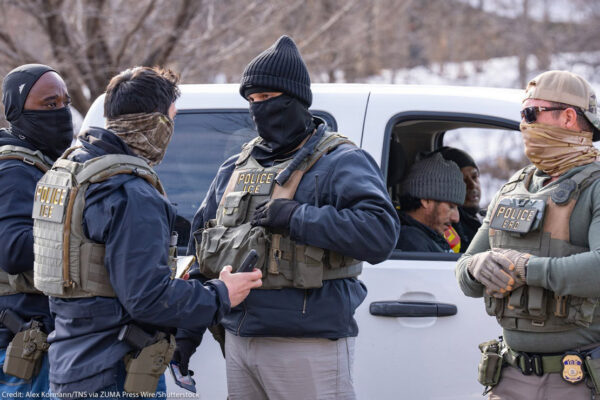ļž–” ”∆Ķ of Minnesota and ļž–” ”∆Ķ Comment on the Trump Administration Announcing an End to Operation Metro Surge
MINNEAPOLIS ‚ÄĒ Today, ‚ÄúBorder Czar‚ÄĚ Tom Homan announced that the administration is ending its domestic federal deployment ‚Äď Operation Metro Surge ‚Äď in Minnesota. This deployment resulted in shootings, deaths, and innumerable constitutional rights violations. Masked federal agents in military gear have ignored basic human rights in their enforcement activity against Minnesotans, especially targeting Somali and Latino communities.
‚ÄúFor the past two months, Minneapolis and St. Paul have felt like cities under siege,‚ÄĚ said Deepinder Mayell, Executive Director of the ļž–” ”∆Ķ of Minnesota. ‚ÄúWhile today‚Äôs announcement by Tom Homan is welcomed, federal agents continue to use tactics and practices that violate constitutional rights. There is no evidence that these practices have changed. What we‚Äôve seen in Minnesota represents a significant escalation in the administration's attack on free speech, due process, and equal protection rights. Now is not the time for Minnesotans to rest. The ļž–” ”∆Ķ of Minnesota will continue working in the courts, the legislature, and in our communities to work to rebuild what Operation Metro Surge tried to destroy.‚ÄĚ
There are limited details on how the supposed drawdown will occur and on what timeline. The ļž–” ”∆Ķ of Minnesota and the ļž–” ”∆Ķ will continue our lawsuits and work to hold law enforcement accountable for their abuses.
Similar to other cities and states, after Operation Metro Surge concludes, federal agents will remain in some capacity, and more federal agents could return at any time. We will continue to monitor reports of racial profiling, physical abuse, targeting of children and families, and illegal detention from communities around the nation.
‚ÄúThis ‚Äėoperation‚Äô involved violence, misconduct, and constitutional violations at every turn, and the Minnesota community made the world know the abuses occurring in their neighborhoods,‚ÄĚ said Naureen Shah, Director of Government Affairs for the ļž–” ”∆Ķ‚Äôs Equality Division. ‚ÄúThe administration now says it‚Äôs leaving, a sign that it feels the public‚Äôs outrage, but we know better than to take hollow words as truth. We will continue fighting in court over their attacks on our rights and safety, but let‚Äôs be clear: Congress has a mandate to rein in these federal agencies and ensure that none of these violations happen again in Minneapolis or anywhere else.‚ÄĚ
In Hussen v. Noem, Minnesotans are challenging the administration's policy of racially profiling, unlawfully seizing, and unlawfully arresting people without a warrant and without probable cause. In Tincher v. Noem, Minnesotans are challenging the administration’s policy and practice of retaliation and excessive use of force against people observing, recording, and protesting immigration enforcement activity.


